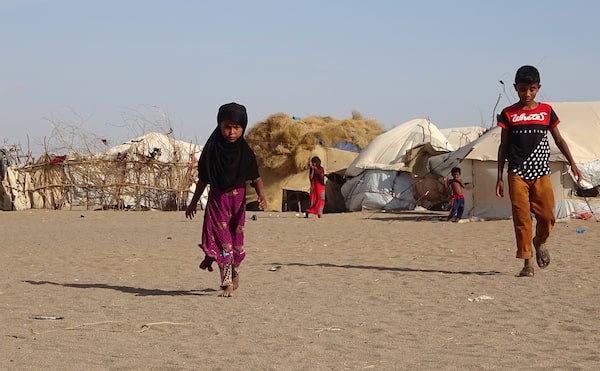
Children walk past tents at a displaced persons camp in the Khokha district of Yemen's western province of Hodeida on May 6, 2020.KHALED ZIAD/AFP/Getty Images
Kristen Hopewell is an associate professor of the School of Public Policy and Global Affairs at the University of British Columbia.
Amid an unprecedented global health and economic crisis, Canada urgently needs to increase its aid to the world’s poorest and most vulnerable countries. While we face immense domestic challenges in responding to the novel coronavirus, the impact of the pandemic has been most dire in the developing world, where COVID-19 is rapidly creating a humanitarian emergency.
Hampered by weaker health systems and limited state capacity, developing countries are acutely vulnerable to the public-health crisis caused by COVID-19. And faced with the resulting economic crisis, they have limited resources to provide support to their populations.
Developing countries have seen all of their major sources of revenue – including export earnings, remittances and tourism – plummet. As in Canada, measures necessary to contain the virus have resulted in a massive and rapid collapse of economic activity. But poor countries are far more limited in their ability to cope with economic shocks. Without social safety nets, their populations are suffering severe hardship.
Coronavirus guide: Updates and essential resources about the COVID-19 pandemic
Over the past three decades, the world has made significant gains in reducing poverty; the number of people living in extreme poverty has fallen by more than two-thirds. However, because of the global economic collapse expected to result from the pandemic, it is estimated that nearly half a billion people will be thrown into extreme poverty worldwide.
In the developing world, the collapse of incomes is a matter of life and death. Global lockdowns prohibit many of the world’s poor from working. Without work, many cannot eat. The United Nations World Food Programme has warned that the pandemic will lead to vast food shortages and “famines of biblical proportions.” It predicts that 265 million people will be on the brink of famine by the end of the year.
Amid a massive increase in extreme poverty and the threat of widespread hunger and famine, the UN has issued an urgent global appeal for aid: US$6.7-billion is needed immediately to help the world’s most vulnerable countries cope with the pandemic.
In Canada, the government has done an excellent job of providing much-needed aid to its citizens. It quickly stepped in with aid for workers who have lost income, helped businesses avoid layoffs and prevent bankruptcy, and gave targeted assistance to vulnerable populations including seniors, children, Indigenous communities and low-income essential workers.
But in addition to helping our own citizens, Canada also needs to play a role in aiding the world’s poorest and most vulnerable populations, who will be hardest hit by the crisis. This means significantly increasing our foreign-aid contributions.
Canada’s aid spending is low compared with other rich countries and has fallen in recent years. The Canadian government spends just about 0.25 per cent of our gross domestic product on foreign aid – far below the internationally agreed-upon target of 0.7 per cent. Adjusted for the size of their economies, Scandinavian countries provide four to five times more international development aid than Canada. Britain, Germany, Switzerland and Finland each spend more than double what Canada does.
In early April, Canada announced a $159-million increase in its foreign-aid funding in response to COVID-19. To put this in perspective, however, the federal government has committed $146-billion in domestic spending to protect Canadian workers and their families from the economic blow of the pandemic. Given the scale of the challenge facing the world’s poor, this minuscule increase in foreign aid is simply not enough. Canada can and should do more.
This is an important opportunity for Canada to step up and exercise global leadership, which is essential if it wants its current bid for a UN Security Council seat to succeed.
During the 2008 global food crisis, when a spike in world food prices threatened to dramatically increase world hunger, Canada played a leading role in co-ordinating the international response to the crisis by working with both the Group of Eight and the Group of 20. Backed by a principled commitment to increase its own foreign aid, Canadian leadership served to mitigate the worst effects of the crisis and bolstered global food security.
Canada has the capacity to play a similarly important role in the current crisis, particularly given the absence of leadership from traditional big powers such as the United States.
As one of the world’s richest countries, Canada has a critical role to play in averting a worldwide catastrophe. It has a moral obligation to do so, and helping to combat the pandemic globally and contribute to a safer and healthier world is also in the direct interest of all Canadians.
Sign up for the Coronavirus Update newsletter to read the day’s essential coronavirus news, features and explainers written by Globe reporters and editors.